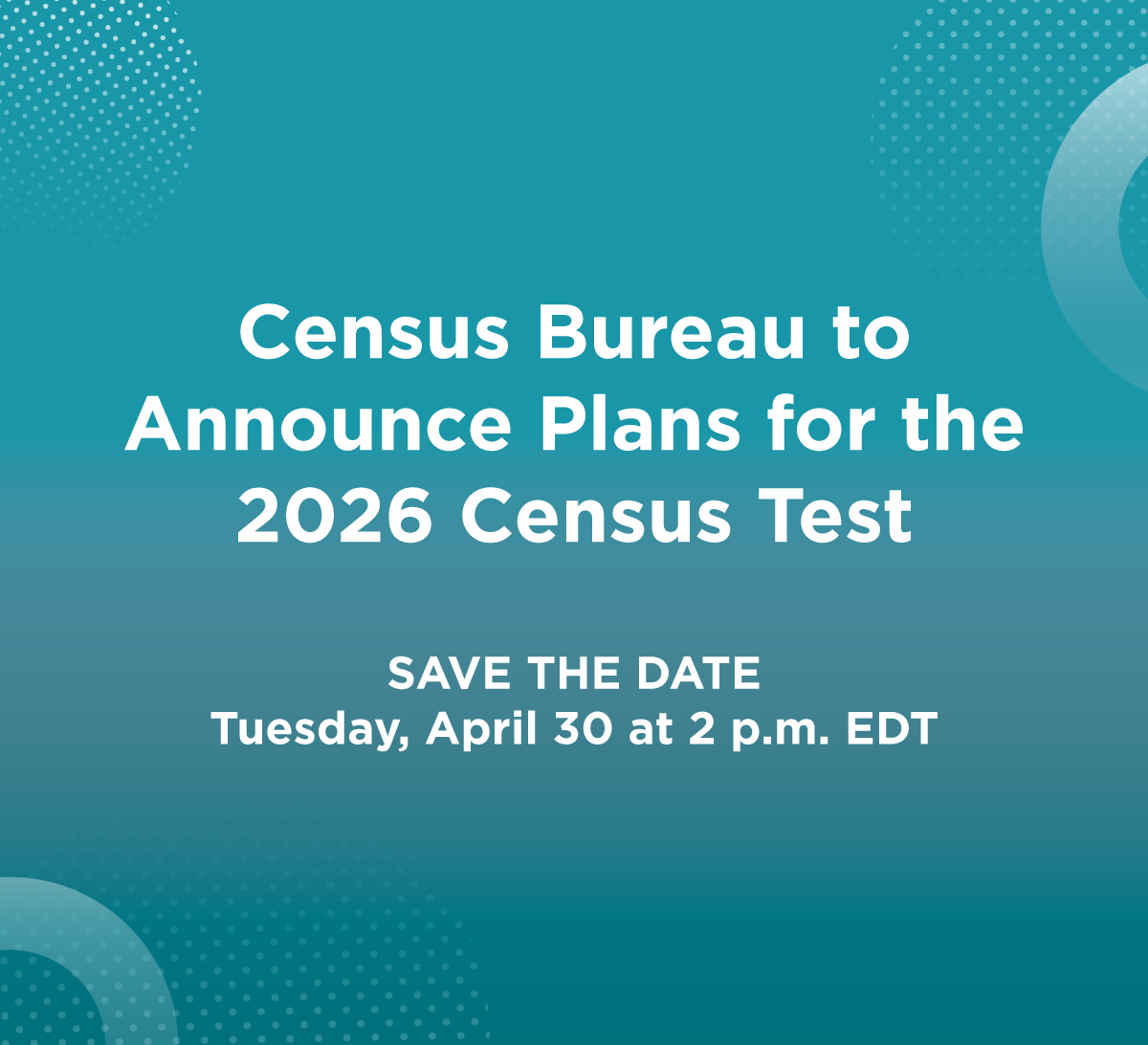Recapping a Phenomenal 2023 at the U.S. Census Bureau
As my second year as director of the U.S. Census Bureau draws to a close, I have been reflecting on all that we’ve accomplished in 2023 – and it’s a lot. As a large agency with employees and offices dispersed across our nation, sometimes it can be hard to see the big picture of our achievements. So here are some of the highlights.
Our success lies in the ability to put relevant, useful statistical data into the hands of the public. This year brought a host of new data (along with easy-to-use infographics and data visualizations) that enable communities to plan for hospitals and schools, advance economic development, improve emergency services, construct roads, inform businesses looking to add jobs and more. Did you know Census Bureau data guided more than $2.8 trillion in federal funding distributed to states, communities, tribal governments and other recipients in FY 2021?
In 2023, we released a wealth of data on race and ethnicity in America, including from the 2020 Census Detailed Housing and Characteristics File (and Detailed DHC-A), Demographic Analysis and Population Estimates.
And from the American Community Survey (ACS), we produced both the 2018-2022 5-year estimates and 2022 1-year estimates, as well as the Selected Population and American Indian and Alaska Native (AIAN) Tables.
We also delivered our 2023 National Population Projections, a comprehensive analysis of our nation’s projected births, deaths and net international migration through the year 2100. We announced the findings of three reports estimating income, poverty and health insurance coverage in America. And we released the 2020 Island Areas Census counts of people living in American Samoa, the Commonwealth of the Northern Mariana Islands, Guam and the U.S. Virgin Islands.
We’re also looking ahead to improve future data releases. Like all statistical agencies, the Census Bureau faces decreasing survey participation rates, increased costs and other challenges. We need to continuously adapt our collection methods to meet America’s data needs and maintain our data quality standards. This year, we announced several new ways to collect data that are more accurate, timely, relevant and meet the needs of the public.
- We rolled out plans to modernize the Current Population Survey. The first step is already underway, as work has begun on an internet self-response mode designed to reduce respondent burden and improve response rates, among other advantages.
- We piloted the new Annual Integrated Economic Survey, set to launch in March. This re-engineered survey integrates and replaces seven existing annual business surveys into a streamlined, single survey. It’s easier for businesses to complete, collects better and more timely data, and is more efficient and less costly.
- We are now engaging American Indian and Alaska Native (AIAN) stakeholders on the design of new experimental data products. Until now, the Census Bureau has primarily published statistics that delineate AIAN as a category within larger, more generalized products. We’re widening our lens to work across programs to develop statistical products that speak directly to stakeholder needs.
- We continued to work closely with the chief statistician and U.S. Office of Management and Budget as they review Statistical Policy Directive 15 that governs how the federal government collects race and ethnicity data.
Throughout the year, we continued our work on the 2030 Census. As part of our commitment to open and transparent communication, we commenced a series of webinars on our preparations for the next decennial population count. In these webinars, we provided a detailed timeline for 2030 Census planning, testing, and operational design and development.
We also talked about the dozens of research projects already underway. You can read about them all in our 2030 Census Research Project Explorer tool. Several projects primarily focus on reaching, motivating and accurately counting historically undercounted populations (HUPs). Many others involve HUP as part of their execution, analysis and interpretation.
We also established a new federal advisory panel that focuses on 2030 Census. The 2030 Census Advisory Committee (CAC) will be distinct from our two other committees – the National Advisory Committee (NAC) and the Census Scientific Advisory Committee (CSAC). The NAC and CSAC provide feedback across the Census Bureau enterprise on our many programs and initiatives, not just the decennial census. The 2030 CAC will focus exclusively on the operational, technical and communications aspects of the next once-a-decade count. CAC members will represent stakeholder organizations, groups, interests and viewpoints. The first meeting will be held in 2024.
Speaking of censuses… The 2022 Economic Census was another huge undertaking this year. Every 5 years, the Census Bureau gathers data about America’s businesses, workforce and trillions of dollars in sales by product and services. The economic census is the cornerstone of the nation’s economic statistics and the most comprehensive measure of American economic activity. Businesses, local communities and individuals can use economic census data to make decisions in their everyday lives. For instance, our Census Business Builder tool blends economic and demographic data at low levels of geography to help inform entrepreneurs and corporations alike.
This economic census gathered 2022 year-end figures on over 8 million employer business establishments, with information on approximately 4 million coming from direct data collection and the rest from administrative records. We also made updates to reflect changes in the economy – for example, we asked about the acquisition and use of business technologies like touch screens, electric vehicles, additive manufacturing and robotics.
Now, let’s talk more about external engagement. I’ve said before that one of my principal priorities is to seek out and listen and talk to the multitude of diverse voices across our nation. We recognize the value and importance of different perspectives, and we are actively engaging the public. As an agency, we’re implementing a community-of-the-whole effort to accomplish our mission. The Census Bureau must work hand-in-hand with stakeholders, researchers, community partners, the corporate world, elected officials – everyone – to achieve our mission to provide quality data on our nation’s people, places and economy. This helps us to be innovative and creative, and ultimately to produce accurate, relevant, useful data.
I shared some of my travels and meetings earlier this year. Since my last update, I have continued to make a concerted effort to engage stakeholders, partners, associations, elected officials and local communities across America. Here are some highlights:
- I continued my “community conversations” with groups in Sacramento, California; Louisville, Kentucky; Detroit, Michigan; San Juan, Puerto Rico; and Reno, Nevada, to name a few. I spoke with community groups and organizations about how the Census Bureau is continuously working to improve our statistical programs to better serve and represent underserved populations; our conversations illuminated the data needs of different groups across our nation.
- It was my honor to give the President’s Invited Address at the 2023 Joint Statistical Meetings in Toronto. It focused on leadership and specifically about how I’m leading the Census Bureau. The leadership principles I articulated are the same as they have been throughout my career: bringing your whole self to the table; understanding the organization you’re leading; and advancing the organization’s mission by setting goals that flow from organizational values.
- I attended the Data Innovation Symposium – hosted by the Census Bureau! – in San Juan, Puerto Rico. I spoke about using a collective approach to innovation to improve equity and governance in Puerto Rico; the other presentations and trainings ranged from Puerto Rico’s federal statistical infrastructure to race and ethnicity reporting, vulnerability and resilience data, workforce indicators, and geospatial data. I also took advantage of my visit to meet with the government officials, the Puerto Rico Chamber of Commerce and local community foundations. I signed a memorandum of understanding for a formal partnership with the University of Puerto Rico in a ceremony with the university’s president.
- I continued to meet with students and academics across several different disciplines to discuss the uses and power of Census Bureau data. It was a pleasure to meet with folks at Syracuse University, the University of Maryland, the University of Puerto Rico, Rice University, the University of Alaska Anchorage and Drexel University – and I hope they bring their talents and unique perspectives to the Census Bureau in their future professional endeavors!
- In addition to my engagements with tribal officials and representatives at the United South and Eastern Tribes annual meeting and the Alaska Region Bureau of Indian Affairs Providers Conference, I was also honored to meet with the Reno-Sparks Indian Colony, the Intertribal Council of Nevada and the Pyramid Lake Paiute Tribe. I appreciated hearing the many ways Census Bureau data are used in Indian Country and how we can strengthen our nation-to-nation relationships. We also discussed the Census Bureau’s development of new experimental data products designed with the AIAN community in mind.
- I traveled to New York City for the 6th Annual Hispanic Leadership Summit for the We Are All Human Conference. It was an honor to meet at the United Nations and participate in the "From Data to Action" panel that centered around the significance and impact of Census Bureau data.
- I delivered the keynote address at San Antonio’s CityFest. It was great to be back in my hometown to discuss the growth and demographic change the city has experienced over the last several years – and how Census Bureau data can help it understand and navigate those changes.
- At the 2023 California Ethnic Media Expo & Awards ceremony in Sacramento, I spoke about the enduring power of ethnic media and its important role in the census. Ethnic media outlets are trusted voices in their communities and are critical to connecting with key ethnic and local audiences who have been historically hard to count.
- I attended the GeoGov Summit to talk about how the Census Bureau empowers policymakers, government and communities to find solutions to problems with geospatial data. Geospatial data can be an absolute treasure when combined with our statistical information about people, the economy, health care and climate!
- In Atlanta, I sat down with John Hope Bryant, CEO of Operation Hope, Inc., at the HOPE Global Forums conference to discuss how the Census Bureau’s economic data can help businesses in underserved communities identify opportunities for growth. For example, Operation HOPE – a valued partner -- uses our data in its HOPE Community Credit Score Index that takes a close look at the financial health of communities and helps gauge their specific needs.
- I also regularly engaged with my fellow Census Bureau employees! Along with other agency leadership, I met with almost 400 field supervisors from across the country at our first-ever National Field Supervisor Training. Field staff are the backbone of the Census Bureau. They and their teams have the task of dealing with challenging situations and do so professionally. It’s work that requires incredible effort, patience and dedication. And thanks to their detailed planning and coordination, we’re able to obtain the cooperation and participation of the public — which we know is not always easy.
In my meetings with the field supervisors and other Census Bureau staff this year, I noticed two things. First, they are dedicated to our mission and work hard toward achieving it. And second, they are proud to serve their nation. It is an honor and privilege to work alongside them.
I look forward to continuing to learn, serve and meet with even more of you in 2024! Be on the lookout for a new blog from me in the new year outlining the Census Bureau’s priorities and path forward.
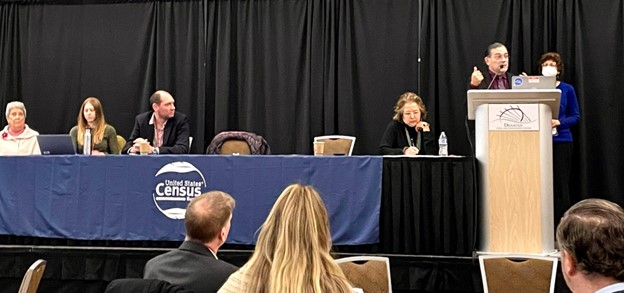
Holding a tribal consultation at the Bureau of Indian Affairs’ Providers Conference in Anchorage, Alaska.
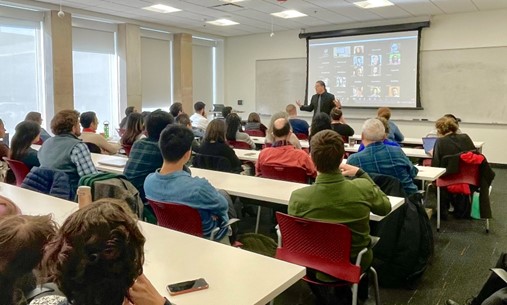
Speaking to students at Drexel University in Philadelphia.
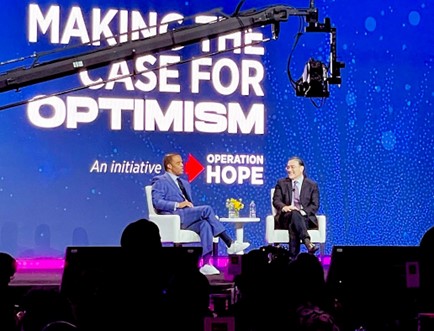
In conversation with John Hope Bryant, CEO of Operation HOPE, Inc., at the HOPE Global Forums in Atlanta.

At the United Nations in New York City to participate in the We Are All Human Foundation’s “From Data to Action” session.
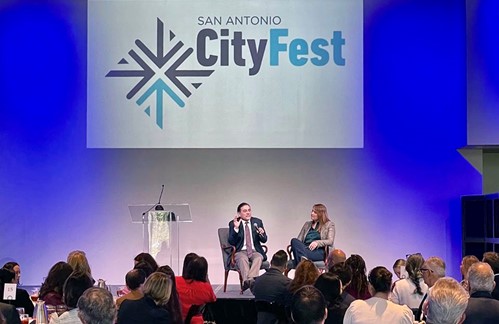
Speaking about the power of data at San Antonio’s CityFest.
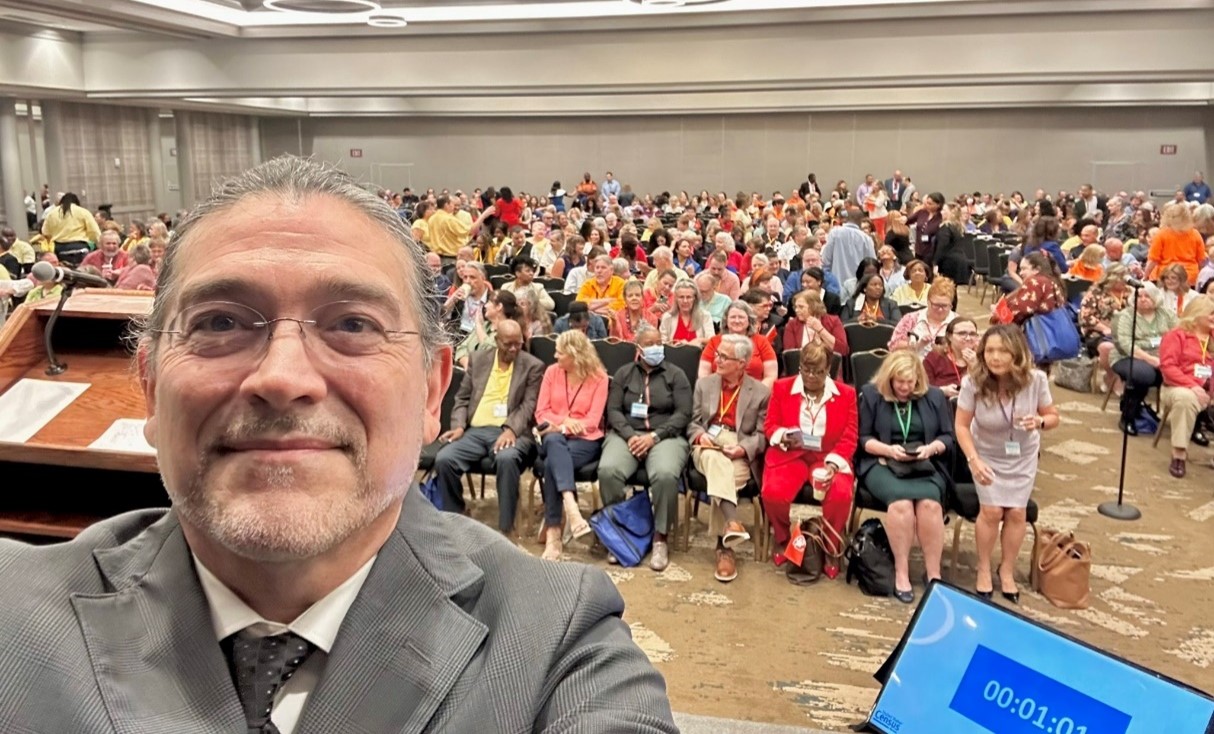
Meeting with Census Bureau Field Supervisors from across the nation.
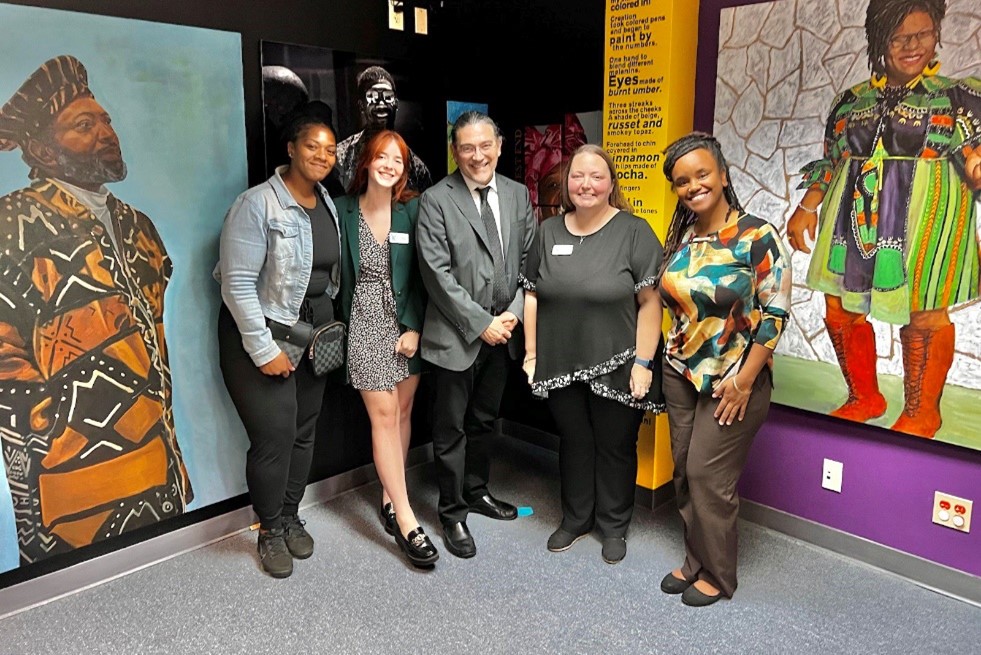
Meeting with community stakeholders Kentucky Youth Advocates and Play Cousins Collective in Louisville, Kentucky.
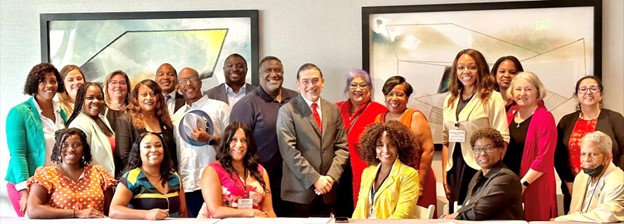
Meeting with community stakeholders hosted by the NAACP in Sacramento, California.
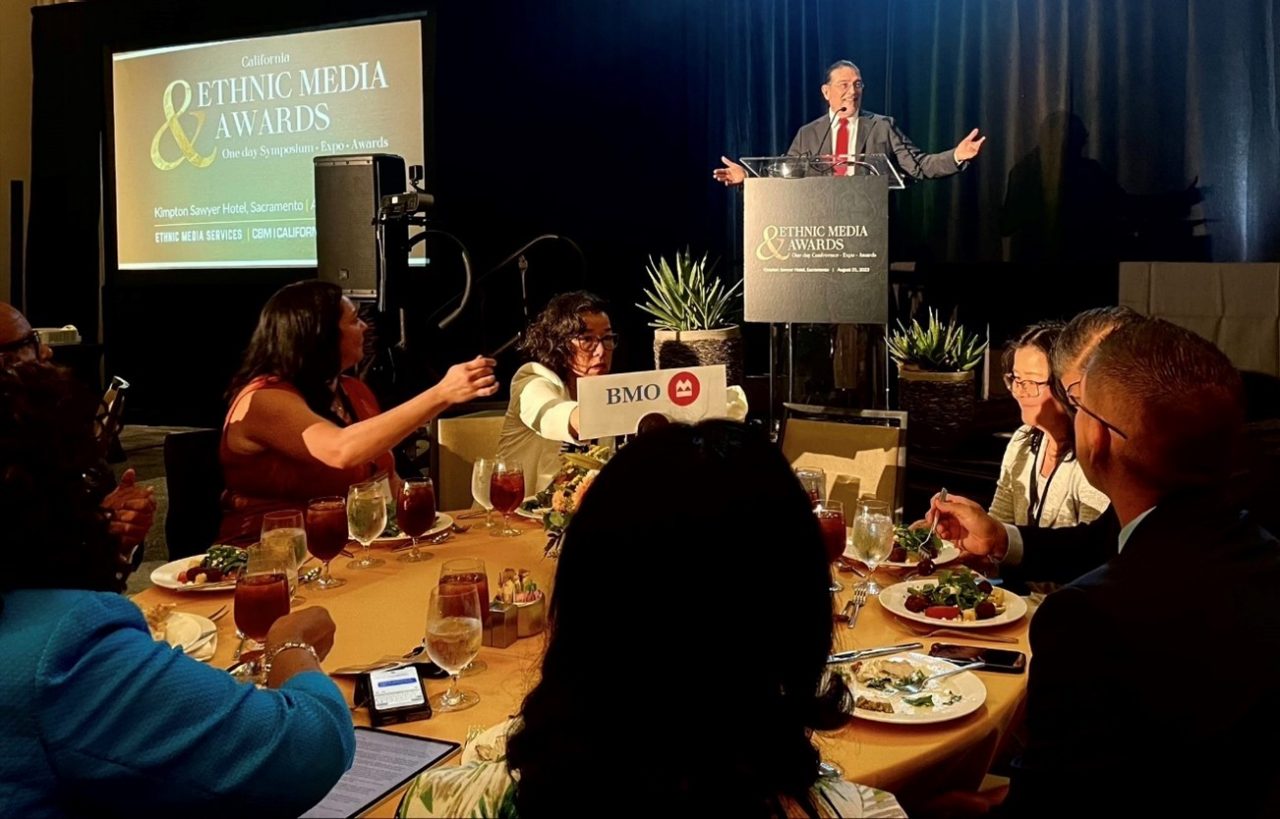
Speaking at the California Ethnic Media Expo & Awards ceremony in Sacramento, California.
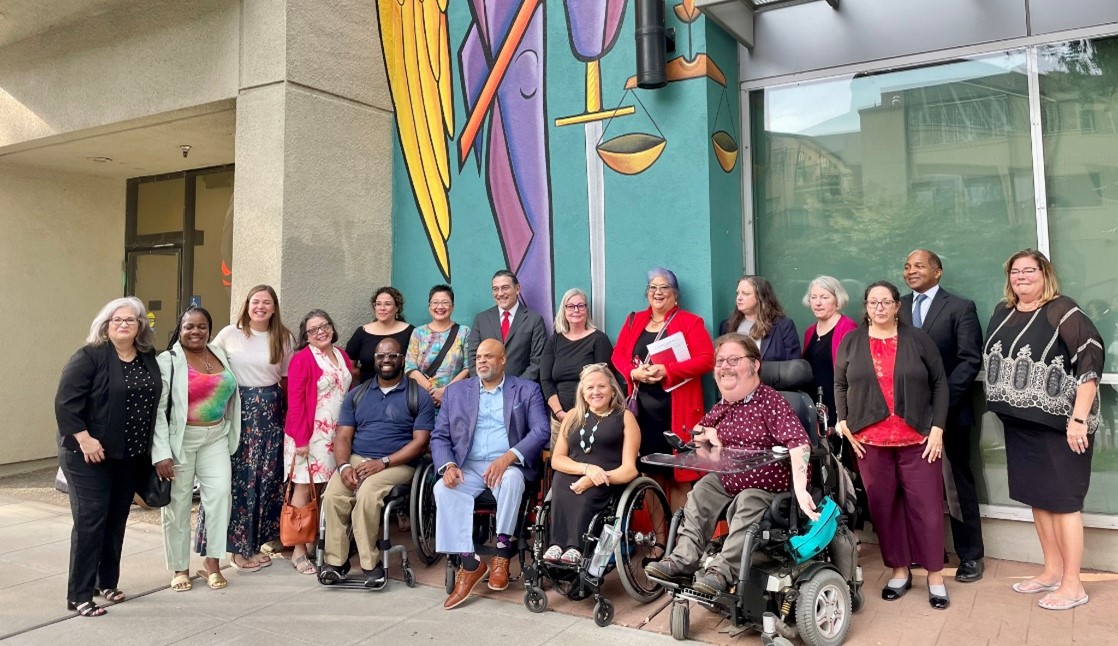
Meeting with community stakeholders from Disability Rights California and the Disability Rights Education & Defense Fund in Sacramento, California.
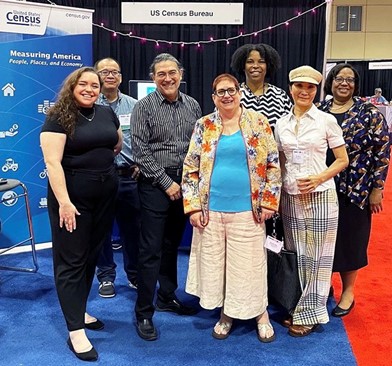
Staffing the Census Bureau booth at the Joint Statistical Meetings in Toronto.


